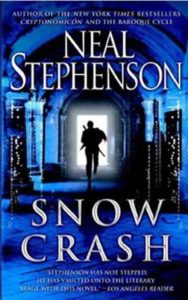 I read Snow Crash, a classic sci-fi novel, because I thought it might be a useful “comp” to a novel I just finished that involved adventures in cyberspace. It wasn’t. It was pure sci-fi, not at all comparable to a psi-fi novel.
I read Snow Crash, a classic sci-fi novel, because I thought it might be a useful “comp” to a novel I just finished that involved adventures in cyberspace. It wasn’t. It was pure sci-fi, not at all comparable to a psi-fi novel.
Snow Crash is non-stop action, go-go-go, whoosh, whoosh, with no need to slow down for plot or character development. It features “extreme” skateboarding, samurai swordplay, and adventures in a VR cyberspace, all themes that would appeal to young sci-fi readers.
But it’s not psi-fi. Characters are teenagers looking for a thrill. They have no particular motives except to move fast, talk smart, fight and avoid capture. Plenty of bad guys lurk but there is no particular story goal to be thwarted or defended and no real point to all the kinetic chasing about.
One slight plot line is about a computer virus and/or drug that makes your screen look like white-noise “snow” before it crashes, and if you look directly at that pattern, your mind explodes (or something) like you took a drug OD. Cool, but psychologically speaking, that illuminates nothing.
Another thread involves some kind of ancient Sumerian MacGuffin I couldn’t quite grasp, but the hero had to find it and get it. Why? Mainly so the author could expostulate about religion in a massive info-dump. I think the author was trying to do a Dan Brown thing there but it didn’t work.
The episodic repetition gets old fast and the online VR world is clever but very 1990’s and anyway, Neuromancer, which this novel copies, had already been done so what’s the point? The samurai swordfighting trope was also a me-too. DaVinci Code meets Neuromancer with the Ninja Turtles? A sure-fire hit for somebody, not me.
This novel is an acknowledged “classic” in the sci-fi literature but doesn’t make the cut for psi-fi because it doesn’t attempt to say anything about what it means to be human, which a psi-fi novel would require.
Stephenson, Neal (1992). Snow Crash. New York: Bantam (468pp).